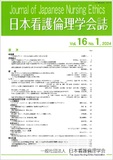Japanese
English
- 販売していません
- Abstract 文献概要
- 参考文献 Reference
本研究は、看護師の道徳的効力感に関連する倫理教育プログラムにおけるCNSの具体的な支援内容を明らかにし、CNSのコンサルテーションおよび倫理調整の役割を考察することを目的とした。研究方法にはアクションリサーチを導入し、参加看護師とCNSとの看護実践の会話内容による逐語録を質的記述的に分析した。その結果【参加者の気がかりから問題の本質に導く】【参加者の能力を見極め実現可能な教育方法を選択する】【倫理課題解決の方略を提案する】【リソースを活用し調整する】【参加者のエネルギーに配慮しながら支援し、実現に導く】【参加者の強みを引き出し自信につながる実践を実現させる】の6カテゴリーが見出された。CNSの支援は、参加看護師の自己効力の形成を促し、倫理的意思決定および倫理的実践に影響を与えたことが考えられ、本プログラムにおけるCNSの倫理調整とコンサルテーション役割の重要性が示唆された。
The purpose of this study was to clarify the support provided by the CNSs(Certified Nurse Specialists)in an ethics education program related to nurses' moral efficacy and to discuss the role of CNS consultation and ethics coordination. We introduced action research into the research method, conversations on nursing practice of ethical cases between participating nurses and the CNSs were recorded, and the verbatim transcripts were analyzed qualitatively and descriptively. As a result, the following six categories of CNSs' practices were extracted; "Leading the participants' concerns to the essence of the problem", "Assessing participants' abilities and selecting feasible educational methods", "Proposing strategies for solving ethical issues", "Utilizing and coordinating resources", "Providing support and leading to realization while paying attention to the energy of the participants ", "Drawing out the participant's abilities and realize a practice that will lead to confidence". The CNSs support may have enhanced the participants' sense of self-efficacy and influenced their ethical decision-making and ethical practice. This suggests the importance of the ethical coordination and consultation role of the CNSs in this program.
Copyright © 2024, The Japan Nursing Ethics Associatin. All rights reserved.


